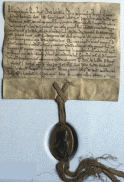|
|
|
|
|
|
|
News & Views item - November 2008 |
![]() Minister Releases Texts of Public Research Agencies' Charters.
(November 19, 2008)
Minister Releases Texts of Public Research Agencies' Charters.
(November 19, 2008)
The Minister for Innovation, Industry, Science and Research, Kim Carr, today released the texts of the four charters that the minister has signed on behalf of the federal government together with the chairs of the boards of
the Commonwealth Scientific and Industrial Research Organisation(CSIRO),
the Australian Institute of Marine Science (AIMS),
the Australian Nuclear Science and Technology Organisation (ANSTO) and
the Australian Institute of Aboriginal and Torres Strait Islander Studies (AIATSIS).
The Departmental media release states:
The charters entrench a set of General Principles, which are:
These charters
were developed during 2008 following extensive consultation with research
agencies and vary slightly to reflect the specific circumstances of the
agencies.
The text of the four charters are available in PDF format and differ only slightly in detail.
However, what is evident is that the degree of freedom of expression afforded the individual employed by the research agencies is dependent on the interpretation of the charter and the good will of the government of the day, and the administrators in charge of the particular research agency.
Here for instance are the salient passages of CSIRO's charter
with the government:
In principle, CSIRO should generally adopt an open approach to the communication of research outputs, with a more constrained approach to be adopted by exception and in accordance with clearly stipulated organisational policy applying to particular types of research activities and outputs.
This general principle may not necessarily extend to each and every research output of CSIRO.
The Government, CSIRO and its researchers have a shared responsibility to encourage debate on scientific and other research issues of public interest... To this end, it is essential that those who have expertise in the areas under debate are able to communicate new ideas and to infuse public debate with the best research and new knowledge.
Recognition of the role for researchers in such
communication and debate
CSIRO and its researchers recognise that CSIRO’s participation in public debate
should canvas research and factually based discussion of scientific issues.
Where relevant, this might extend to discussion of the implications or scenarios
stemming from particular scientific findings.
CSIRO and its researchers should seek to provide scientific knowledge in a form which can be widely understood, and where relevant, easy to apply, with a view to better informing the community. The engagement of CSIRO and its researchers with the community is a key component of an informed innovation system.
The Government and the public look to researchers to provide expert advice in their fields. Validation, particularly peer review, is central to assuring the quality of research and should be the foundation for any public comment.
The Government and CSIRO recognise that there may be divergent views on both issues of public interest and the expert advice that is provided in relation to them. The parties each agree that vigorous open debate of these views is important; as is the right of researchers to change their opinion in the light of such debate or new findings from research.
Governments are elected with the responsibility to govern. With this goes the responsibility for the articulation, formulation and implementation of policies that address the issues and challenges that Australia faces. In deciding how to best meet these challenges, governments must continually make choices between competing policy options.
As CSIRO employees [they] should not advocate, defend or publicly debate the merits of government or opposition policies (including policies of previous Commonwealth governments, or State or local or foreign governments).
The final paragraph warrants the question: "May a CSIRO employee if he states in public that he is speaking solely for himself and his opinions are not necessarily those of his employer or any current or previous Australian government, voice his views without fear of retribution and must he be a "card carrying", bona fide expert in the area on which he expresses his viewpoint?"